Social Policy: Ideological Perspectives and the UK Welfare System
VerifiedAdded on 2022/08/08
|14
|3981
|405
Essay
AI Summary
This essay provides a comprehensive analysis of social policy, focusing on the historical development and ideological perspectives that have shaped the UK's welfare state. The introduction establishes the context of social policy, highlighting its evolution through industrial and post-industrial societies, and emphasizing the influence of financial and environmental factors. The discussion delves into the significance of studying social and political ideologies to understand social policy, exploring concepts like liberalism, socialism, and neoliberalism. It examines how these ideologies have influenced the development of the welfare state in the UK, from the classical liberalism of the 19th century to the rise of socialism and the post-World War II welfare state influenced by Keynesian economics and the Beveridge report. The essay also addresses the impact of neoliberal approaches and globalization, which have led to modifications in the welfare state. The essay concludes by discussing the future of the welfare state, its ongoing relevance, and its adaptation to the challenges of the financial and technological ages. Overall, the essay offers a critical examination of social policy, its ideological underpinnings, and its evolution within the UK context.
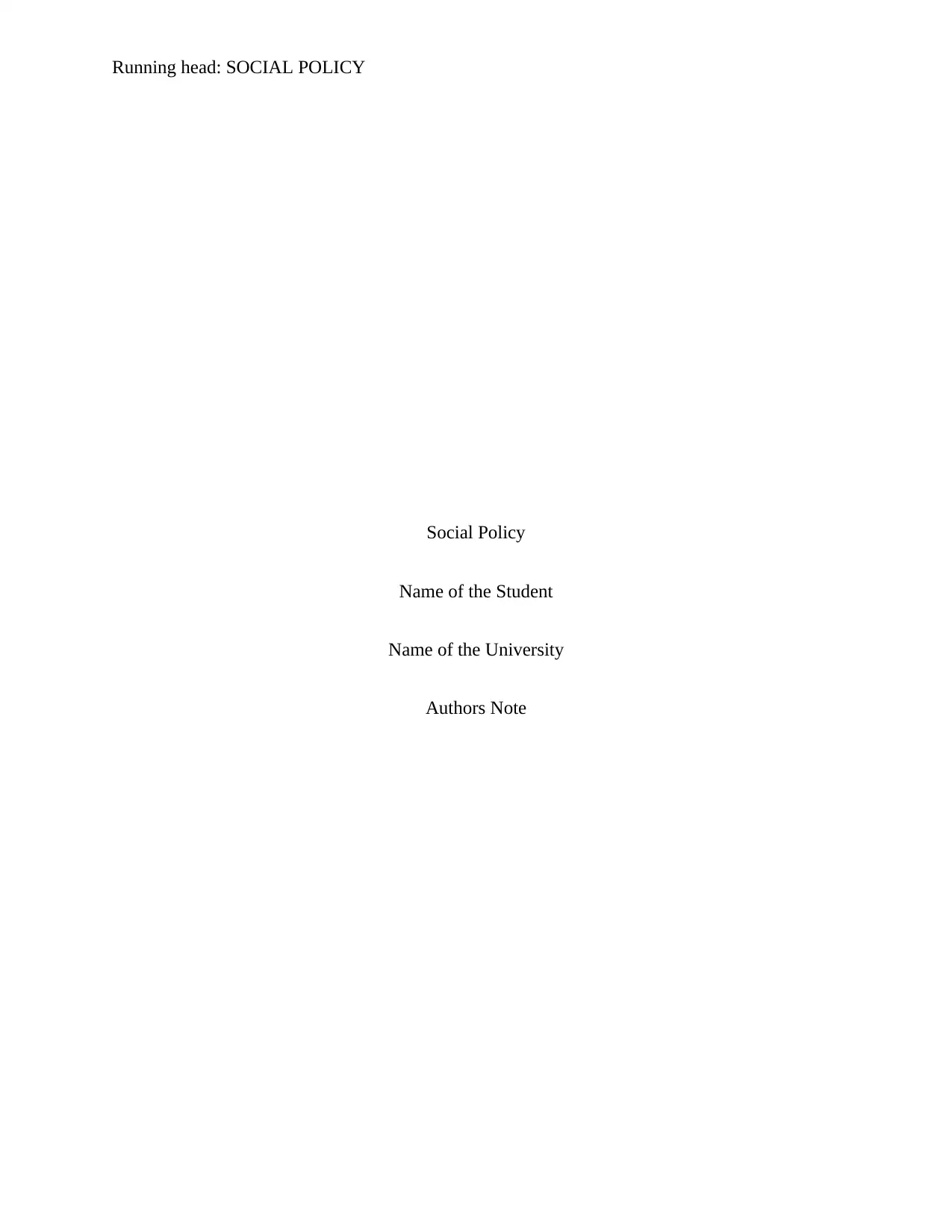
Running head: SOCIAL POLICY
Social Policy
Name of the Student
Name of the University
Authors Note
Social Policy
Name of the Student
Name of the University
Authors Note
Paraphrase This Document
Need a fresh take? Get an instant paraphrase of this document with our AI Paraphraser
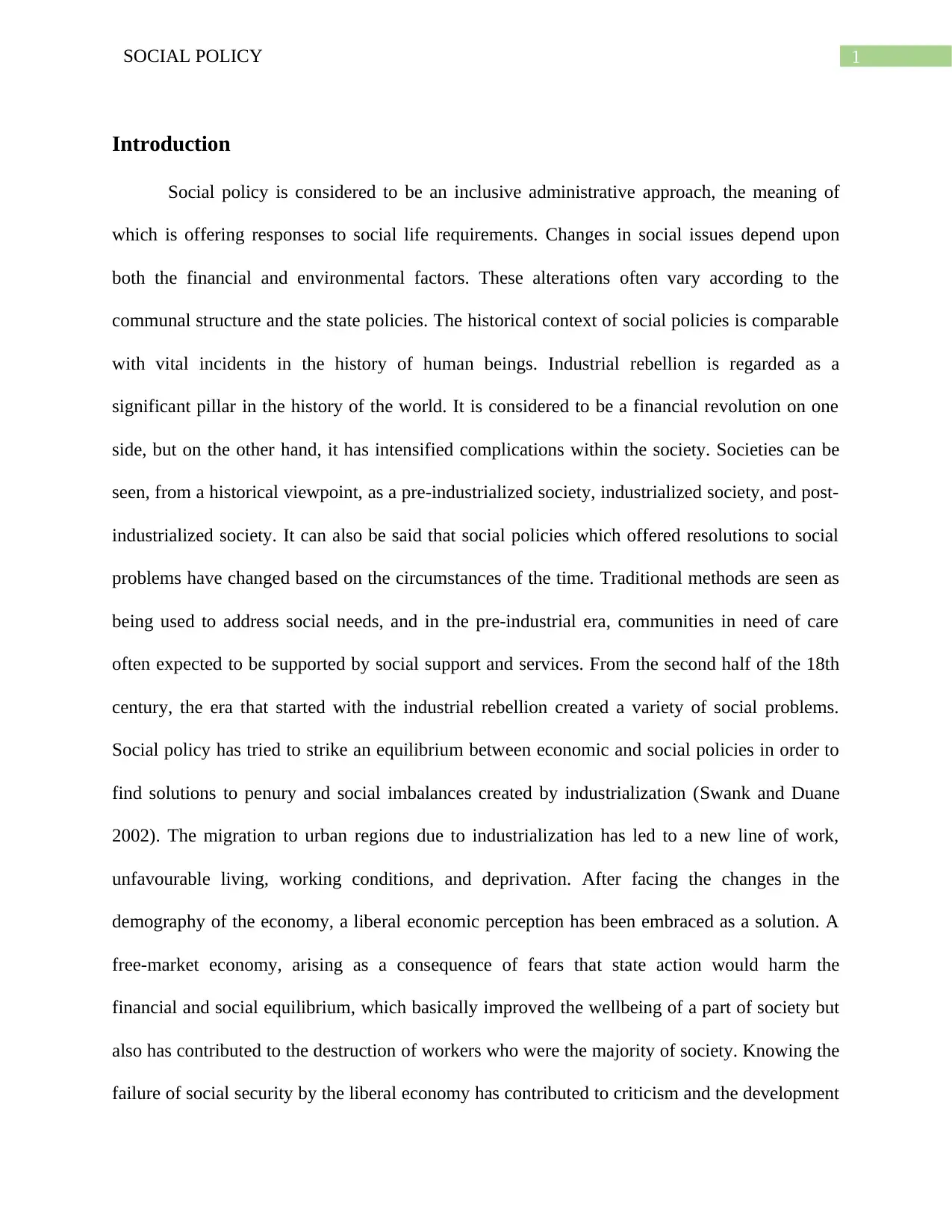
1SOCIAL POLICY
Introduction
Social policy is considered to be an inclusive administrative approach, the meaning of
which is offering responses to social life requirements. Changes in social issues depend upon
both the financial and environmental factors. These alterations often vary according to the
communal structure and the state policies. The historical context of social policies is comparable
with vital incidents in the history of human beings. Industrial rebellion is regarded as a
significant pillar in the history of the world. It is considered to be a financial revolution on one
side, but on the other hand, it has intensified complications within the society. Societies can be
seen, from a historical viewpoint, as a pre-industrialized society, industrialized society, and post-
industrialized society. It can also be said that social policies which offered resolutions to social
problems have changed based on the circumstances of the time. Traditional methods are seen as
being used to address social needs, and in the pre-industrial era, communities in need of care
often expected to be supported by social support and services. From the second half of the 18th
century, the era that started with the industrial rebellion created a variety of social problems.
Social policy has tried to strike an equilibrium between economic and social policies in order to
find solutions to penury and social imbalances created by industrialization (Swank and Duane
2002). The migration to urban regions due to industrialization has led to a new line of work,
unfavourable living, working conditions, and deprivation. After facing the changes in the
demography of the economy, a liberal economic perception has been embraced as a solution. A
free-market economy, arising as a consequence of fears that state action would harm the
financial and social equilibrium, which basically improved the wellbeing of a part of society but
also has contributed to the destruction of workers who were the majority of society. Knowing the
failure of social security by the liberal economy has contributed to criticism and the development
Introduction
Social policy is considered to be an inclusive administrative approach, the meaning of
which is offering responses to social life requirements. Changes in social issues depend upon
both the financial and environmental factors. These alterations often vary according to the
communal structure and the state policies. The historical context of social policies is comparable
with vital incidents in the history of human beings. Industrial rebellion is regarded as a
significant pillar in the history of the world. It is considered to be a financial revolution on one
side, but on the other hand, it has intensified complications within the society. Societies can be
seen, from a historical viewpoint, as a pre-industrialized society, industrialized society, and post-
industrialized society. It can also be said that social policies which offered resolutions to social
problems have changed based on the circumstances of the time. Traditional methods are seen as
being used to address social needs, and in the pre-industrial era, communities in need of care
often expected to be supported by social support and services. From the second half of the 18th
century, the era that started with the industrial rebellion created a variety of social problems.
Social policy has tried to strike an equilibrium between economic and social policies in order to
find solutions to penury and social imbalances created by industrialization (Swank and Duane
2002). The migration to urban regions due to industrialization has led to a new line of work,
unfavourable living, working conditions, and deprivation. After facing the changes in the
demography of the economy, a liberal economic perception has been embraced as a solution. A
free-market economy, arising as a consequence of fears that state action would harm the
financial and social equilibrium, which basically improved the wellbeing of a part of society but
also has contributed to the destruction of workers who were the majority of society. Knowing the
failure of social security by the liberal economy has contributed to criticism and the development
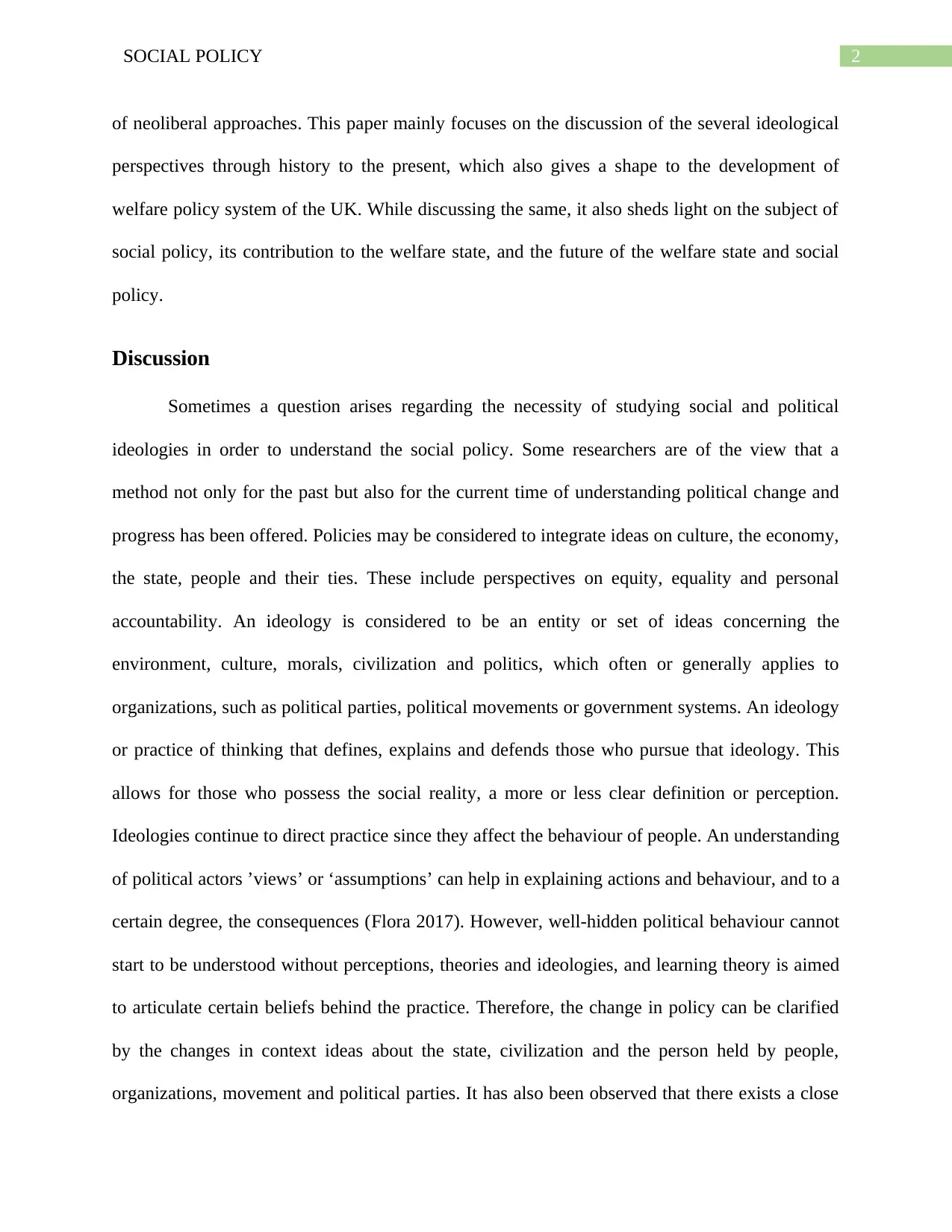
2SOCIAL POLICY
of neoliberal approaches. This paper mainly focuses on the discussion of the several ideological
perspectives through history to the present, which also gives a shape to the development of
welfare policy system of the UK. While discussing the same, it also sheds light on the subject of
social policy, its contribution to the welfare state, and the future of the welfare state and social
policy.
Discussion
Sometimes a question arises regarding the necessity of studying social and political
ideologies in order to understand the social policy. Some researchers are of the view that a
method not only for the past but also for the current time of understanding political change and
progress has been offered. Policies may be considered to integrate ideas on culture, the economy,
the state, people and their ties. These include perspectives on equity, equality and personal
accountability. An ideology is considered to be an entity or set of ideas concerning the
environment, culture, morals, civilization and politics, which often or generally applies to
organizations, such as political parties, political movements or government systems. An ideology
or practice of thinking that defines, explains and defends those who pursue that ideology. This
allows for those who possess the social reality, a more or less clear definition or perception.
Ideologies continue to direct practice since they affect the behaviour of people. An understanding
of political actors ’views’ or ‘assumptions’ can help in explaining actions and behaviour, and to a
certain degree, the consequences (Flora 2017). However, well-hidden political behaviour cannot
start to be understood without perceptions, theories and ideologies, and learning theory is aimed
to articulate certain beliefs behind the practice. Therefore, the change in policy can be clarified
by the changes in context ideas about the state, civilization and the person held by people,
organizations, movement and political parties. It has also been observed that there exists a close
of neoliberal approaches. This paper mainly focuses on the discussion of the several ideological
perspectives through history to the present, which also gives a shape to the development of
welfare policy system of the UK. While discussing the same, it also sheds light on the subject of
social policy, its contribution to the welfare state, and the future of the welfare state and social
policy.
Discussion
Sometimes a question arises regarding the necessity of studying social and political
ideologies in order to understand the social policy. Some researchers are of the view that a
method not only for the past but also for the current time of understanding political change and
progress has been offered. Policies may be considered to integrate ideas on culture, the economy,
the state, people and their ties. These include perspectives on equity, equality and personal
accountability. An ideology is considered to be an entity or set of ideas concerning the
environment, culture, morals, civilization and politics, which often or generally applies to
organizations, such as political parties, political movements or government systems. An ideology
or practice of thinking that defines, explains and defends those who pursue that ideology. This
allows for those who possess the social reality, a more or less clear definition or perception.
Ideologies continue to direct practice since they affect the behaviour of people. An understanding
of political actors ’views’ or ‘assumptions’ can help in explaining actions and behaviour, and to a
certain degree, the consequences (Flora 2017). However, well-hidden political behaviour cannot
start to be understood without perceptions, theories and ideologies, and learning theory is aimed
to articulate certain beliefs behind the practice. Therefore, the change in policy can be clarified
by the changes in context ideas about the state, civilization and the person held by people,
organizations, movement and political parties. It has also been observed that there exists a close
⊘ This is a preview!⊘
Do you want full access?
Subscribe today to unlock all pages.

Trusted by 1+ million students worldwide
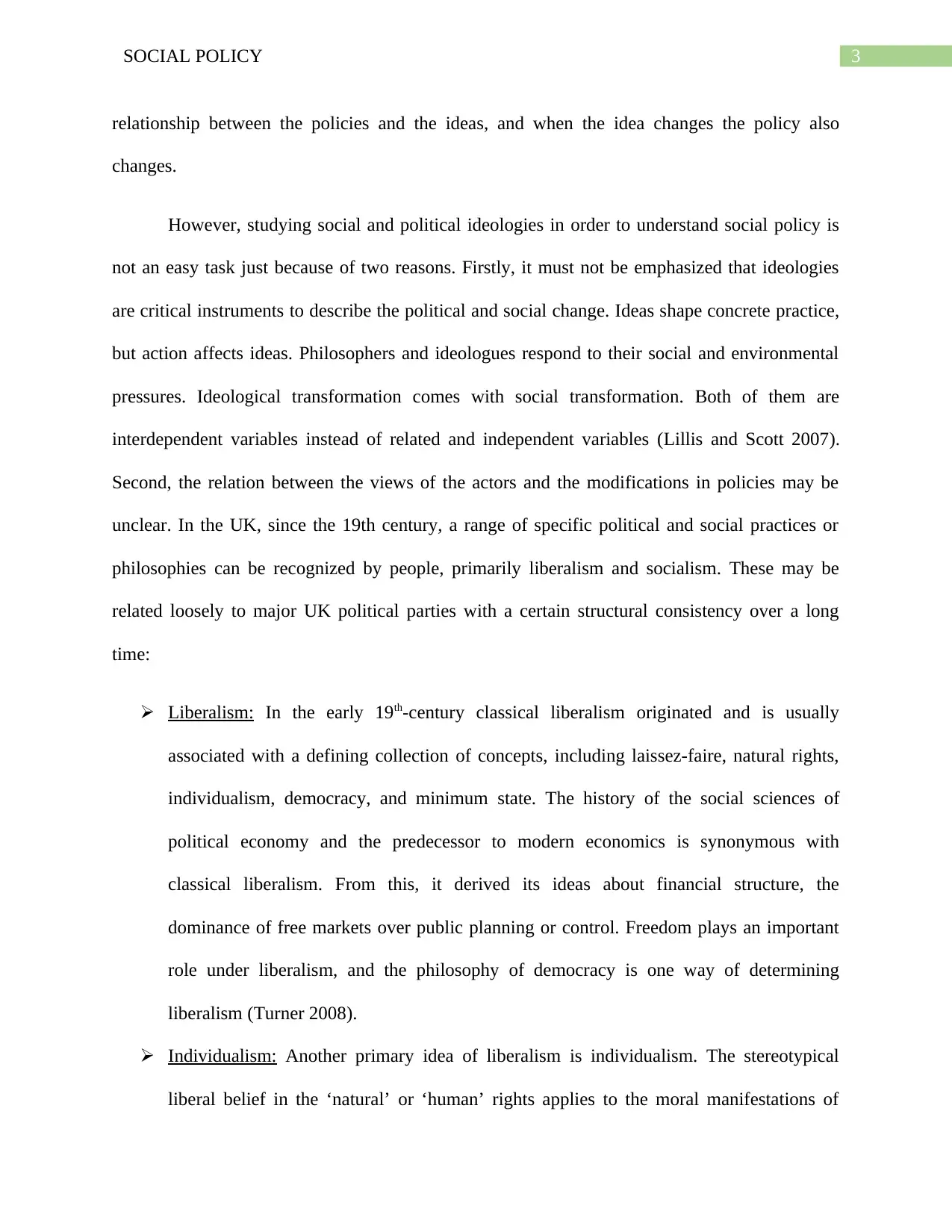
3SOCIAL POLICY
relationship between the policies and the ideas, and when the idea changes the policy also
changes.
However, studying social and political ideologies in order to understand social policy is
not an easy task just because of two reasons. Firstly, it must not be emphasized that ideologies
are critical instruments to describe the political and social change. Ideas shape concrete practice,
but action affects ideas. Philosophers and ideologues respond to their social and environmental
pressures. Ideological transformation comes with social transformation. Both of them are
interdependent variables instead of related and independent variables (Lillis and Scott 2007).
Second, the relation between the views of the actors and the modifications in policies may be
unclear. In the UK, since the 19th century, a range of specific political and social practices or
philosophies can be recognized by people, primarily liberalism and socialism. These may be
related loosely to major UK political parties with a certain structural consistency over a long
time:
Liberalism: In the early 19th-century classical liberalism originated and is usually
associated with a defining collection of concepts, including laissez-faire, natural rights,
individualism, democracy, and minimum state. The history of the social sciences of
political economy and the predecessor to modern economics is synonymous with
classical liberalism. From this, it derived its ideas about financial structure, the
dominance of free markets over public planning or control. Freedom plays an important
role under liberalism, and the philosophy of democracy is one way of determining
liberalism (Turner 2008).
Individualism: Another primary idea of liberalism is individualism. The stereotypical
liberal belief in the ‘natural’ or ‘human’ rights applies to the moral manifestations of
relationship between the policies and the ideas, and when the idea changes the policy also
changes.
However, studying social and political ideologies in order to understand social policy is
not an easy task just because of two reasons. Firstly, it must not be emphasized that ideologies
are critical instruments to describe the political and social change. Ideas shape concrete practice,
but action affects ideas. Philosophers and ideologues respond to their social and environmental
pressures. Ideological transformation comes with social transformation. Both of them are
interdependent variables instead of related and independent variables (Lillis and Scott 2007).
Second, the relation between the views of the actors and the modifications in policies may be
unclear. In the UK, since the 19th century, a range of specific political and social practices or
philosophies can be recognized by people, primarily liberalism and socialism. These may be
related loosely to major UK political parties with a certain structural consistency over a long
time:
Liberalism: In the early 19th-century classical liberalism originated and is usually
associated with a defining collection of concepts, including laissez-faire, natural rights,
individualism, democracy, and minimum state. The history of the social sciences of
political economy and the predecessor to modern economics is synonymous with
classical liberalism. From this, it derived its ideas about financial structure, the
dominance of free markets over public planning or control. Freedom plays an important
role under liberalism, and the philosophy of democracy is one way of determining
liberalism (Turner 2008).
Individualism: Another primary idea of liberalism is individualism. The stereotypical
liberal belief in the ‘natural’ or ‘human’ rights applies to the moral manifestations of
Paraphrase This Document
Need a fresh take? Get an instant paraphrase of this document with our AI Paraphraser
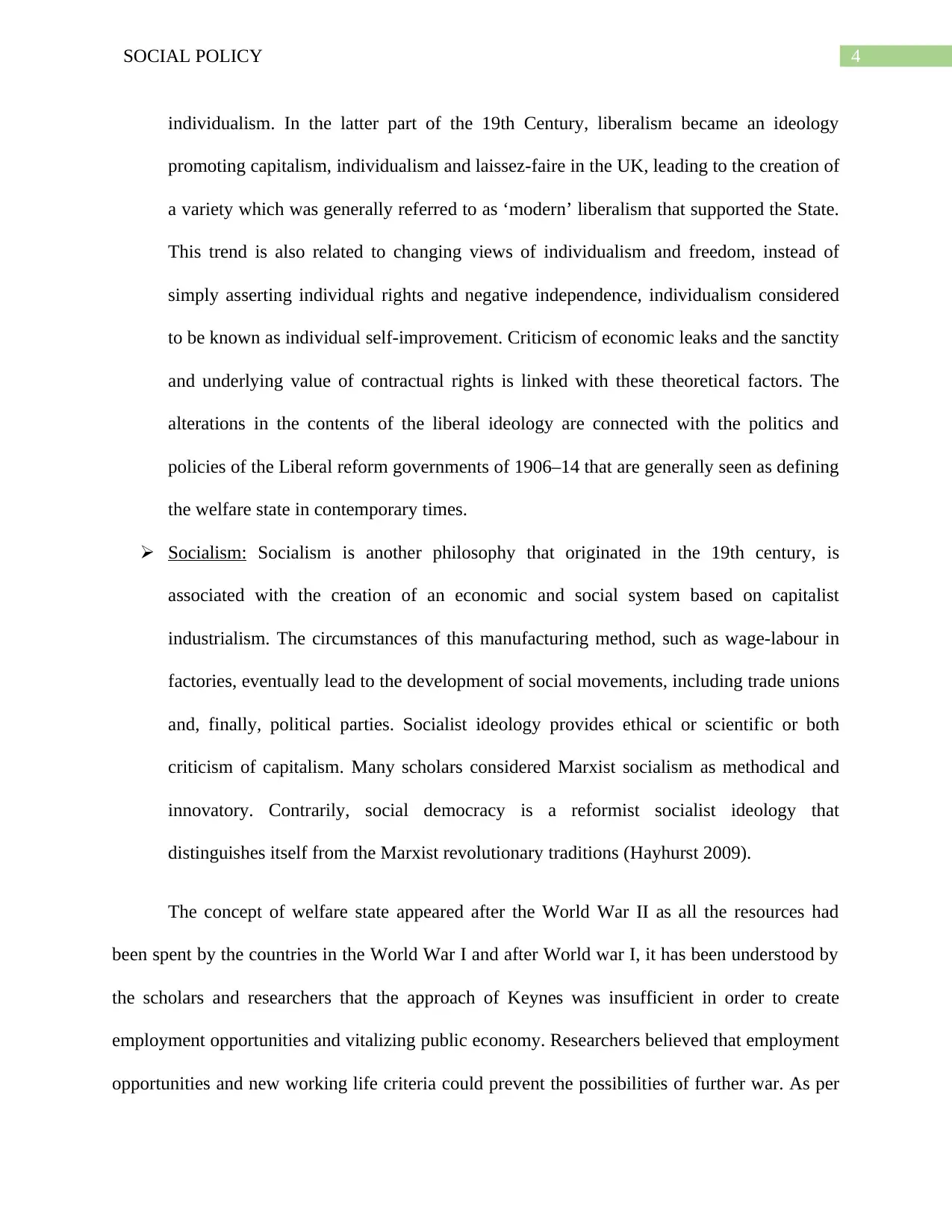
4SOCIAL POLICY
individualism. In the latter part of the 19th Century, liberalism became an ideology
promoting capitalism, individualism and laissez-faire in the UK, leading to the creation of
a variety which was generally referred to as ‘modern’ liberalism that supported the State.
This trend is also related to changing views of individualism and freedom, instead of
simply asserting individual rights and negative independence, individualism considered
to be known as individual self-improvement. Criticism of economic leaks and the sanctity
and underlying value of contractual rights is linked with these theoretical factors. The
alterations in the contents of the liberal ideology are connected with the politics and
policies of the Liberal reform governments of 1906–14 that are generally seen as defining
the welfare state in contemporary times.
Socialism: Socialism is another philosophy that originated in the 19th century, is
associated with the creation of an economic and social system based on capitalist
industrialism. The circumstances of this manufacturing method, such as wage-labour in
factories, eventually lead to the development of social movements, including trade unions
and, finally, political parties. Socialist ideology provides ethical or scientific or both
criticism of capitalism. Many scholars considered Marxist socialism as methodical and
innovatory. Contrarily, social democracy is a reformist socialist ideology that
distinguishes itself from the Marxist revolutionary traditions (Hayhurst 2009).
The concept of welfare state appeared after the World War II as all the resources had
been spent by the countries in the World War I and after World war I, it has been understood by
the scholars and researchers that the approach of Keynes was insufficient in order to create
employment opportunities and vitalizing public economy. Researchers believed that employment
opportunities and new working life criteria could prevent the possibilities of further war. As per
individualism. In the latter part of the 19th Century, liberalism became an ideology
promoting capitalism, individualism and laissez-faire in the UK, leading to the creation of
a variety which was generally referred to as ‘modern’ liberalism that supported the State.
This trend is also related to changing views of individualism and freedom, instead of
simply asserting individual rights and negative independence, individualism considered
to be known as individual self-improvement. Criticism of economic leaks and the sanctity
and underlying value of contractual rights is linked with these theoretical factors. The
alterations in the contents of the liberal ideology are connected with the politics and
policies of the Liberal reform governments of 1906–14 that are generally seen as defining
the welfare state in contemporary times.
Socialism: Socialism is another philosophy that originated in the 19th century, is
associated with the creation of an economic and social system based on capitalist
industrialism. The circumstances of this manufacturing method, such as wage-labour in
factories, eventually lead to the development of social movements, including trade unions
and, finally, political parties. Socialist ideology provides ethical or scientific or both
criticism of capitalism. Many scholars considered Marxist socialism as methodical and
innovatory. Contrarily, social democracy is a reformist socialist ideology that
distinguishes itself from the Marxist revolutionary traditions (Hayhurst 2009).
The concept of welfare state appeared after the World War II as all the resources had
been spent by the countries in the World War I and after World war I, it has been understood by
the scholars and researchers that the approach of Keynes was insufficient in order to create
employment opportunities and vitalizing public economy. Researchers believed that employment
opportunities and new working life criteria could prevent the possibilities of further war. As per
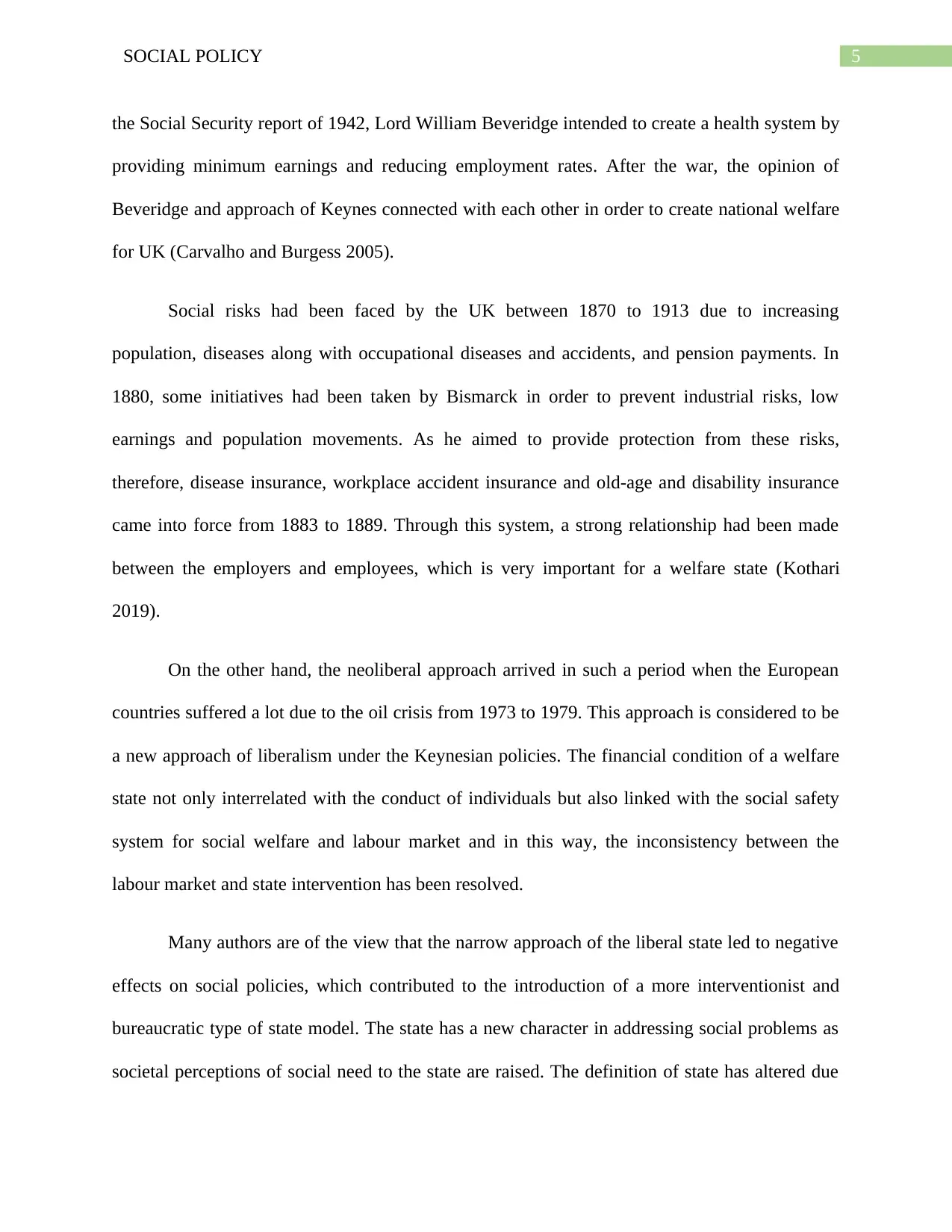
5SOCIAL POLICY
the Social Security report of 1942, Lord William Beveridge intended to create a health system by
providing minimum earnings and reducing employment rates. After the war, the opinion of
Beveridge and approach of Keynes connected with each other in order to create national welfare
for UK (Carvalho and Burgess 2005).
Social risks had been faced by the UK between 1870 to 1913 due to increasing
population, diseases along with occupational diseases and accidents, and pension payments. In
1880, some initiatives had been taken by Bismarck in order to prevent industrial risks, low
earnings and population movements. As he aimed to provide protection from these risks,
therefore, disease insurance, workplace accident insurance and old-age and disability insurance
came into force from 1883 to 1889. Through this system, a strong relationship had been made
between the employers and employees, which is very important for a welfare state (Kothari
2019).
On the other hand, the neoliberal approach arrived in such a period when the European
countries suffered a lot due to the oil crisis from 1973 to 1979. This approach is considered to be
a new approach of liberalism under the Keynesian policies. The financial condition of a welfare
state not only interrelated with the conduct of individuals but also linked with the social safety
system for social welfare and labour market and in this way, the inconsistency between the
labour market and state intervention has been resolved.
Many authors are of the view that the narrow approach of the liberal state led to negative
effects on social policies, which contributed to the introduction of a more interventionist and
bureaucratic type of state model. The state has a new character in addressing social problems as
societal perceptions of social need to the state are raised. The definition of state has altered due
the Social Security report of 1942, Lord William Beveridge intended to create a health system by
providing minimum earnings and reducing employment rates. After the war, the opinion of
Beveridge and approach of Keynes connected with each other in order to create national welfare
for UK (Carvalho and Burgess 2005).
Social risks had been faced by the UK between 1870 to 1913 due to increasing
population, diseases along with occupational diseases and accidents, and pension payments. In
1880, some initiatives had been taken by Bismarck in order to prevent industrial risks, low
earnings and population movements. As he aimed to provide protection from these risks,
therefore, disease insurance, workplace accident insurance and old-age and disability insurance
came into force from 1883 to 1889. Through this system, a strong relationship had been made
between the employers and employees, which is very important for a welfare state (Kothari
2019).
On the other hand, the neoliberal approach arrived in such a period when the European
countries suffered a lot due to the oil crisis from 1973 to 1979. This approach is considered to be
a new approach of liberalism under the Keynesian policies. The financial condition of a welfare
state not only interrelated with the conduct of individuals but also linked with the social safety
system for social welfare and labour market and in this way, the inconsistency between the
labour market and state intervention has been resolved.
Many authors are of the view that the narrow approach of the liberal state led to negative
effects on social policies, which contributed to the introduction of a more interventionist and
bureaucratic type of state model. The state has a new character in addressing social problems as
societal perceptions of social need to the state are raised. The definition of state has altered due
⊘ This is a preview!⊘
Do you want full access?
Subscribe today to unlock all pages.

Trusted by 1+ million students worldwide
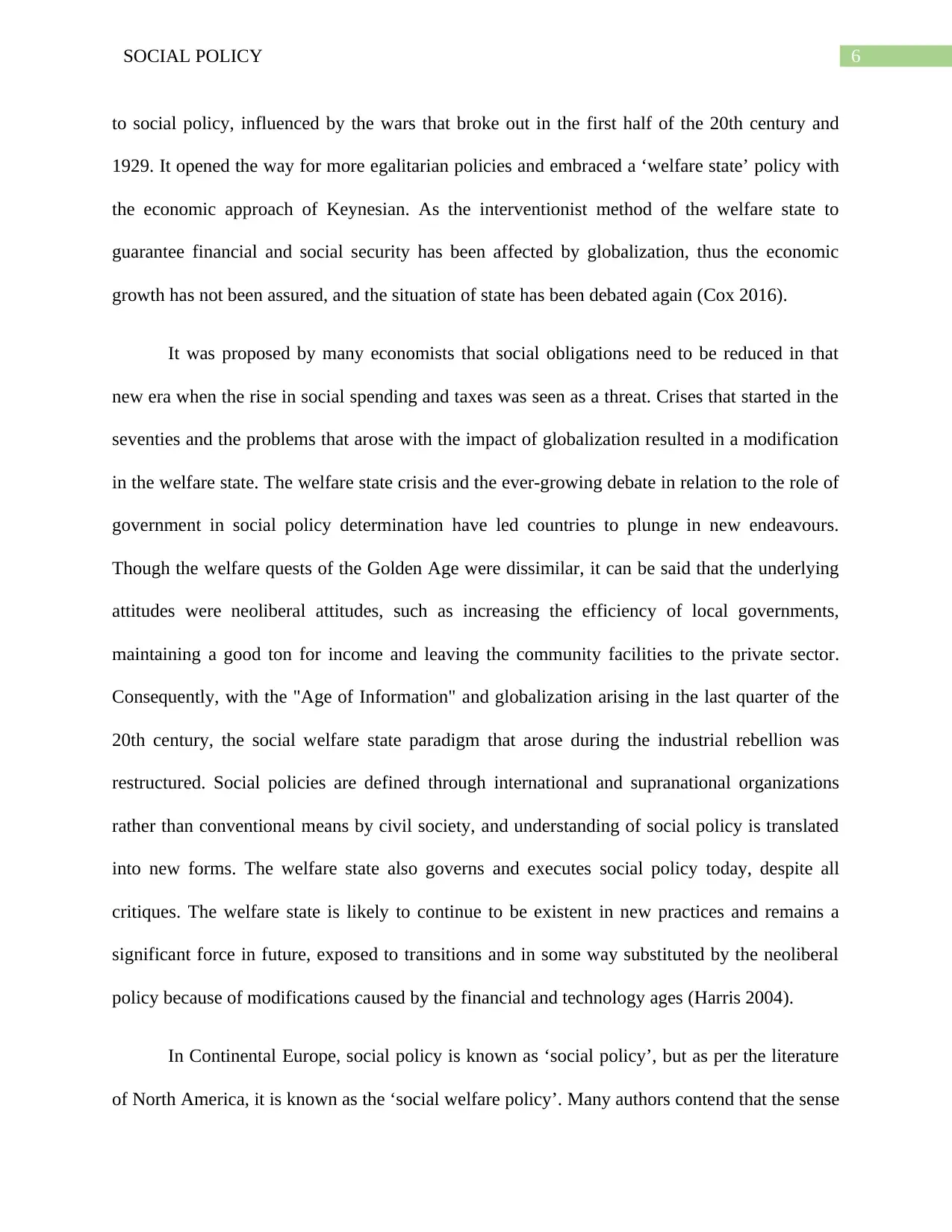
6SOCIAL POLICY
to social policy, influenced by the wars that broke out in the first half of the 20th century and
1929. It opened the way for more egalitarian policies and embraced a ‘welfare state’ policy with
the economic approach of Keynesian. As the interventionist method of the welfare state to
guarantee financial and social security has been affected by globalization, thus the economic
growth has not been assured, and the situation of state has been debated again (Cox 2016).
It was proposed by many economists that social obligations need to be reduced in that
new era when the rise in social spending and taxes was seen as a threat. Crises that started in the
seventies and the problems that arose with the impact of globalization resulted in a modification
in the welfare state. The welfare state crisis and the ever-growing debate in relation to the role of
government in social policy determination have led countries to plunge in new endeavours.
Though the welfare quests of the Golden Age were dissimilar, it can be said that the underlying
attitudes were neoliberal attitudes, such as increasing the efficiency of local governments,
maintaining a good ton for income and leaving the community facilities to the private sector.
Consequently, with the "Age of Information" and globalization arising in the last quarter of the
20th century, the social welfare state paradigm that arose during the industrial rebellion was
restructured. Social policies are defined through international and supranational organizations
rather than conventional means by civil society, and understanding of social policy is translated
into new forms. The welfare state also governs and executes social policy today, despite all
critiques. The welfare state is likely to continue to be existent in new practices and remains a
significant force in future, exposed to transitions and in some way substituted by the neoliberal
policy because of modifications caused by the financial and technology ages (Harris 2004).
In Continental Europe, social policy is known as ‘social policy’, but as per the literature
of North America, it is known as the ‘social welfare policy’. Many authors contend that the sense
to social policy, influenced by the wars that broke out in the first half of the 20th century and
1929. It opened the way for more egalitarian policies and embraced a ‘welfare state’ policy with
the economic approach of Keynesian. As the interventionist method of the welfare state to
guarantee financial and social security has been affected by globalization, thus the economic
growth has not been assured, and the situation of state has been debated again (Cox 2016).
It was proposed by many economists that social obligations need to be reduced in that
new era when the rise in social spending and taxes was seen as a threat. Crises that started in the
seventies and the problems that arose with the impact of globalization resulted in a modification
in the welfare state. The welfare state crisis and the ever-growing debate in relation to the role of
government in social policy determination have led countries to plunge in new endeavours.
Though the welfare quests of the Golden Age were dissimilar, it can be said that the underlying
attitudes were neoliberal attitudes, such as increasing the efficiency of local governments,
maintaining a good ton for income and leaving the community facilities to the private sector.
Consequently, with the "Age of Information" and globalization arising in the last quarter of the
20th century, the social welfare state paradigm that arose during the industrial rebellion was
restructured. Social policies are defined through international and supranational organizations
rather than conventional means by civil society, and understanding of social policy is translated
into new forms. The welfare state also governs and executes social policy today, despite all
critiques. The welfare state is likely to continue to be existent in new practices and remains a
significant force in future, exposed to transitions and in some way substituted by the neoliberal
policy because of modifications caused by the financial and technology ages (Harris 2004).
In Continental Europe, social policy is known as ‘social policy’, but as per the literature
of North America, it is known as the ‘social welfare policy’. Many authors contend that the sense
Paraphrase This Document
Need a fresh take? Get an instant paraphrase of this document with our AI Paraphraser
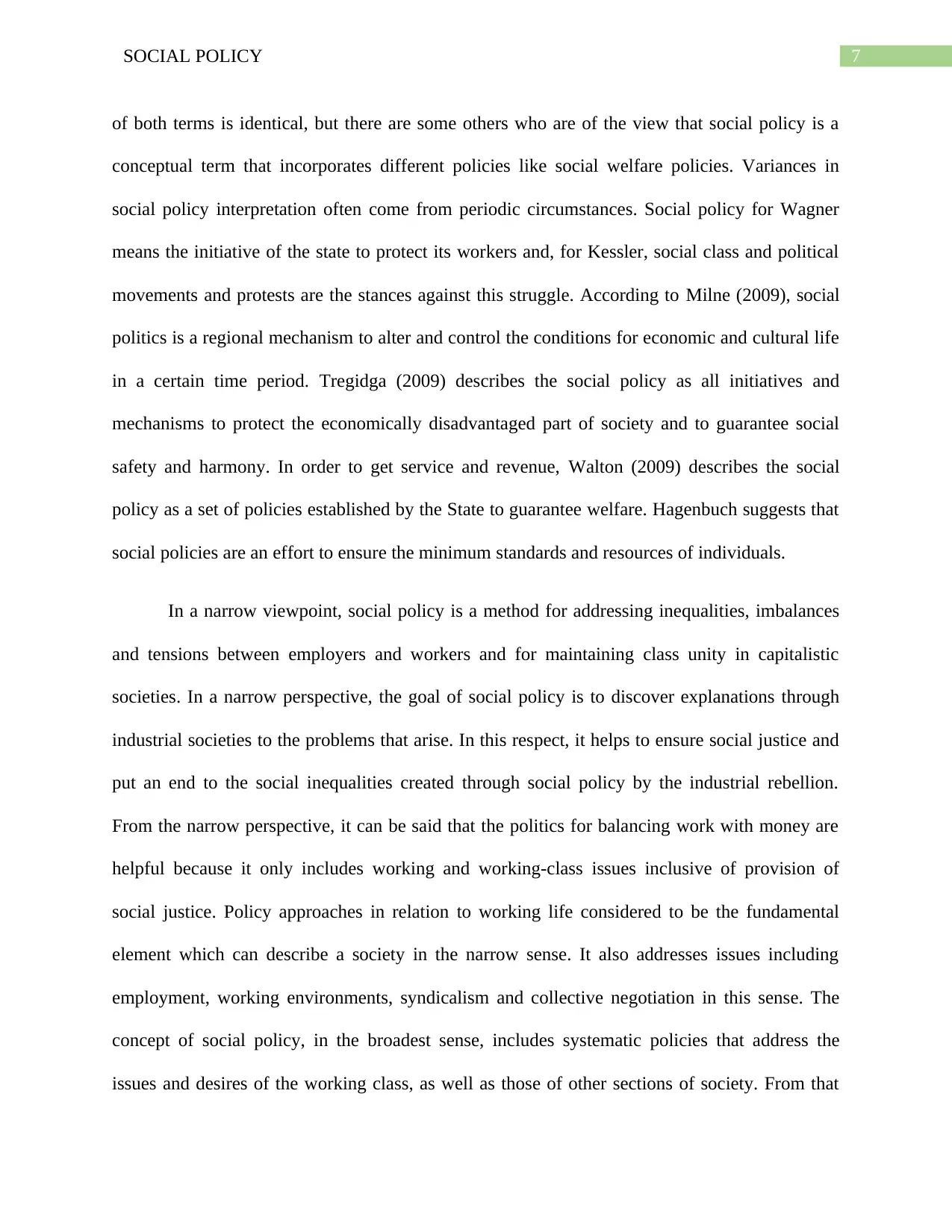
7SOCIAL POLICY
of both terms is identical, but there are some others who are of the view that social policy is a
conceptual term that incorporates different policies like social welfare policies. Variances in
social policy interpretation often come from periodic circumstances. Social policy for Wagner
means the initiative of the state to protect its workers and, for Kessler, social class and political
movements and protests are the stances against this struggle. According to Milne (2009), social
politics is a regional mechanism to alter and control the conditions for economic and cultural life
in a certain time period. Tregidga (2009) describes the social policy as all initiatives and
mechanisms to protect the economically disadvantaged part of society and to guarantee social
safety and harmony. In order to get service and revenue, Walton (2009) describes the social
policy as a set of policies established by the State to guarantee welfare. Hagenbuch suggests that
social policies are an effort to ensure the minimum standards and resources of individuals.
In a narrow viewpoint, social policy is a method for addressing inequalities, imbalances
and tensions between employers and workers and for maintaining class unity in capitalistic
societies. In a narrow perspective, the goal of social policy is to discover explanations through
industrial societies to the problems that arise. In this respect, it helps to ensure social justice and
put an end to the social inequalities created through social policy by the industrial rebellion.
From the narrow perspective, it can be said that the politics for balancing work with money are
helpful because it only includes working and working-class issues inclusive of provision of
social justice. Policy approaches in relation to working life considered to be the fundamental
element which can describe a society in the narrow sense. It also addresses issues including
employment, working environments, syndicalism and collective negotiation in this sense. The
concept of social policy, in the broadest sense, includes systematic policies that address the
issues and desires of the working class, as well as those of other sections of society. From that
of both terms is identical, but there are some others who are of the view that social policy is a
conceptual term that incorporates different policies like social welfare policies. Variances in
social policy interpretation often come from periodic circumstances. Social policy for Wagner
means the initiative of the state to protect its workers and, for Kessler, social class and political
movements and protests are the stances against this struggle. According to Milne (2009), social
politics is a regional mechanism to alter and control the conditions for economic and cultural life
in a certain time period. Tregidga (2009) describes the social policy as all initiatives and
mechanisms to protect the economically disadvantaged part of society and to guarantee social
safety and harmony. In order to get service and revenue, Walton (2009) describes the social
policy as a set of policies established by the State to guarantee welfare. Hagenbuch suggests that
social policies are an effort to ensure the minimum standards and resources of individuals.
In a narrow viewpoint, social policy is a method for addressing inequalities, imbalances
and tensions between employers and workers and for maintaining class unity in capitalistic
societies. In a narrow perspective, the goal of social policy is to discover explanations through
industrial societies to the problems that arise. In this respect, it helps to ensure social justice and
put an end to the social inequalities created through social policy by the industrial rebellion.
From the narrow perspective, it can be said that the politics for balancing work with money are
helpful because it only includes working and working-class issues inclusive of provision of
social justice. Policy approaches in relation to working life considered to be the fundamental
element which can describe a society in the narrow sense. It also addresses issues including
employment, working environments, syndicalism and collective negotiation in this sense. The
concept of social policy, in the broadest sense, includes systematic policies that address the
issues and desires of the working class, as well as those of other sections of society. From that
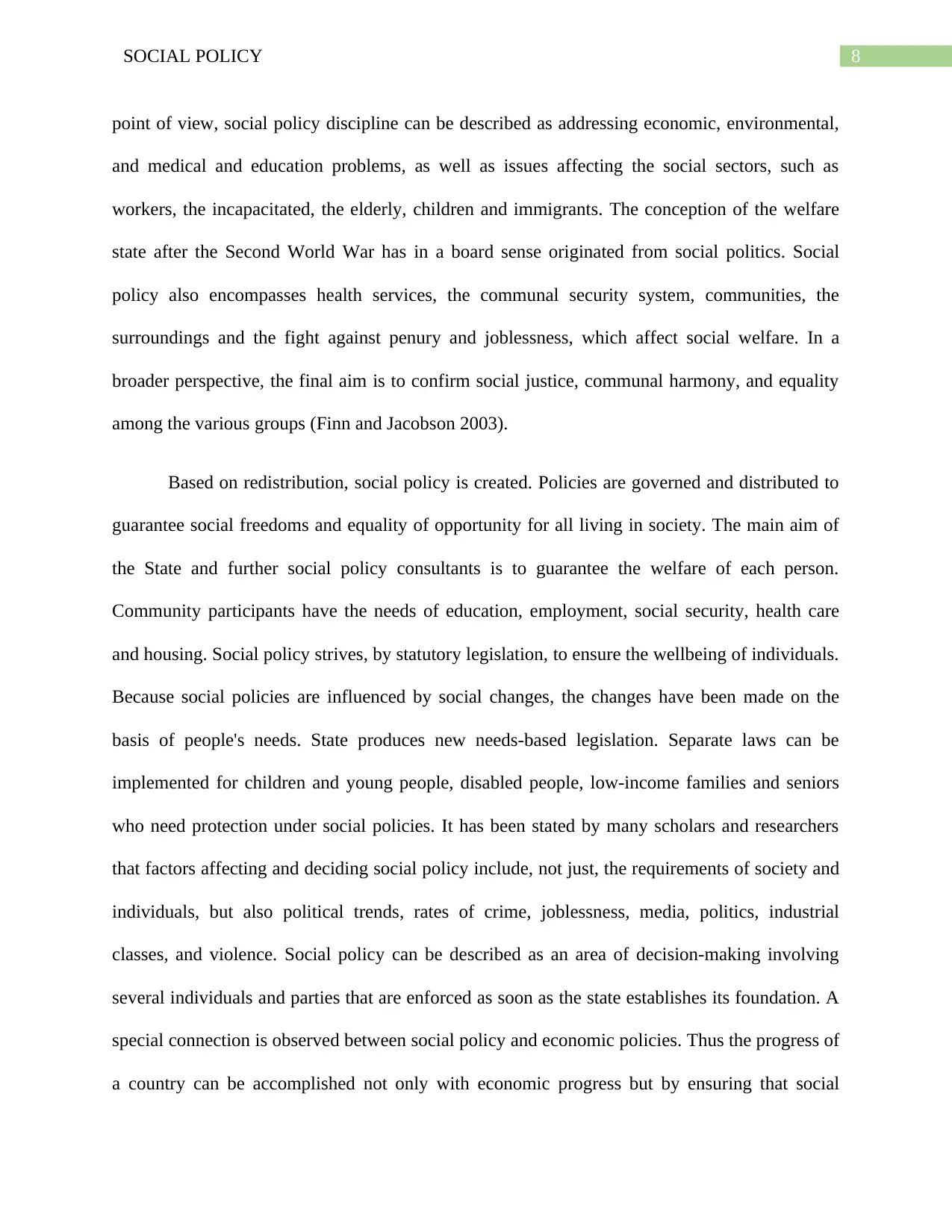
8SOCIAL POLICY
point of view, social policy discipline can be described as addressing economic, environmental,
and medical and education problems, as well as issues affecting the social sectors, such as
workers, the incapacitated, the elderly, children and immigrants. The conception of the welfare
state after the Second World War has in a board sense originated from social politics. Social
policy also encompasses health services, the communal security system, communities, the
surroundings and the fight against penury and joblessness, which affect social welfare. In a
broader perspective, the final aim is to confirm social justice, communal harmony, and equality
among the various groups (Finn and Jacobson 2003).
Based on redistribution, social policy is created. Policies are governed and distributed to
guarantee social freedoms and equality of opportunity for all living in society. The main aim of
the State and further social policy consultants is to guarantee the welfare of each person.
Community participants have the needs of education, employment, social security, health care
and housing. Social policy strives, by statutory legislation, to ensure the wellbeing of individuals.
Because social policies are influenced by social changes, the changes have been made on the
basis of people's needs. State produces new needs-based legislation. Separate laws can be
implemented for children and young people, disabled people, low-income families and seniors
who need protection under social policies. It has been stated by many scholars and researchers
that factors affecting and deciding social policy include, not just, the requirements of society and
individuals, but also political trends, rates of crime, joblessness, media, politics, industrial
classes, and violence. Social policy can be described as an area of decision-making involving
several individuals and parties that are enforced as soon as the state establishes its foundation. A
special connection is observed between social policy and economic policies. Thus the progress of
a country can be accomplished not only with economic progress but by ensuring that social
point of view, social policy discipline can be described as addressing economic, environmental,
and medical and education problems, as well as issues affecting the social sectors, such as
workers, the incapacitated, the elderly, children and immigrants. The conception of the welfare
state after the Second World War has in a board sense originated from social politics. Social
policy also encompasses health services, the communal security system, communities, the
surroundings and the fight against penury and joblessness, which affect social welfare. In a
broader perspective, the final aim is to confirm social justice, communal harmony, and equality
among the various groups (Finn and Jacobson 2003).
Based on redistribution, social policy is created. Policies are governed and distributed to
guarantee social freedoms and equality of opportunity for all living in society. The main aim of
the State and further social policy consultants is to guarantee the welfare of each person.
Community participants have the needs of education, employment, social security, health care
and housing. Social policy strives, by statutory legislation, to ensure the wellbeing of individuals.
Because social policies are influenced by social changes, the changes have been made on the
basis of people's needs. State produces new needs-based legislation. Separate laws can be
implemented for children and young people, disabled people, low-income families and seniors
who need protection under social policies. It has been stated by many scholars and researchers
that factors affecting and deciding social policy include, not just, the requirements of society and
individuals, but also political trends, rates of crime, joblessness, media, politics, industrial
classes, and violence. Social policy can be described as an area of decision-making involving
several individuals and parties that are enforced as soon as the state establishes its foundation. A
special connection is observed between social policy and economic policies. Thus the progress of
a country can be accomplished not only with economic progress but by ensuring that social
⊘ This is a preview!⊘
Do you want full access?
Subscribe today to unlock all pages.

Trusted by 1+ million students worldwide
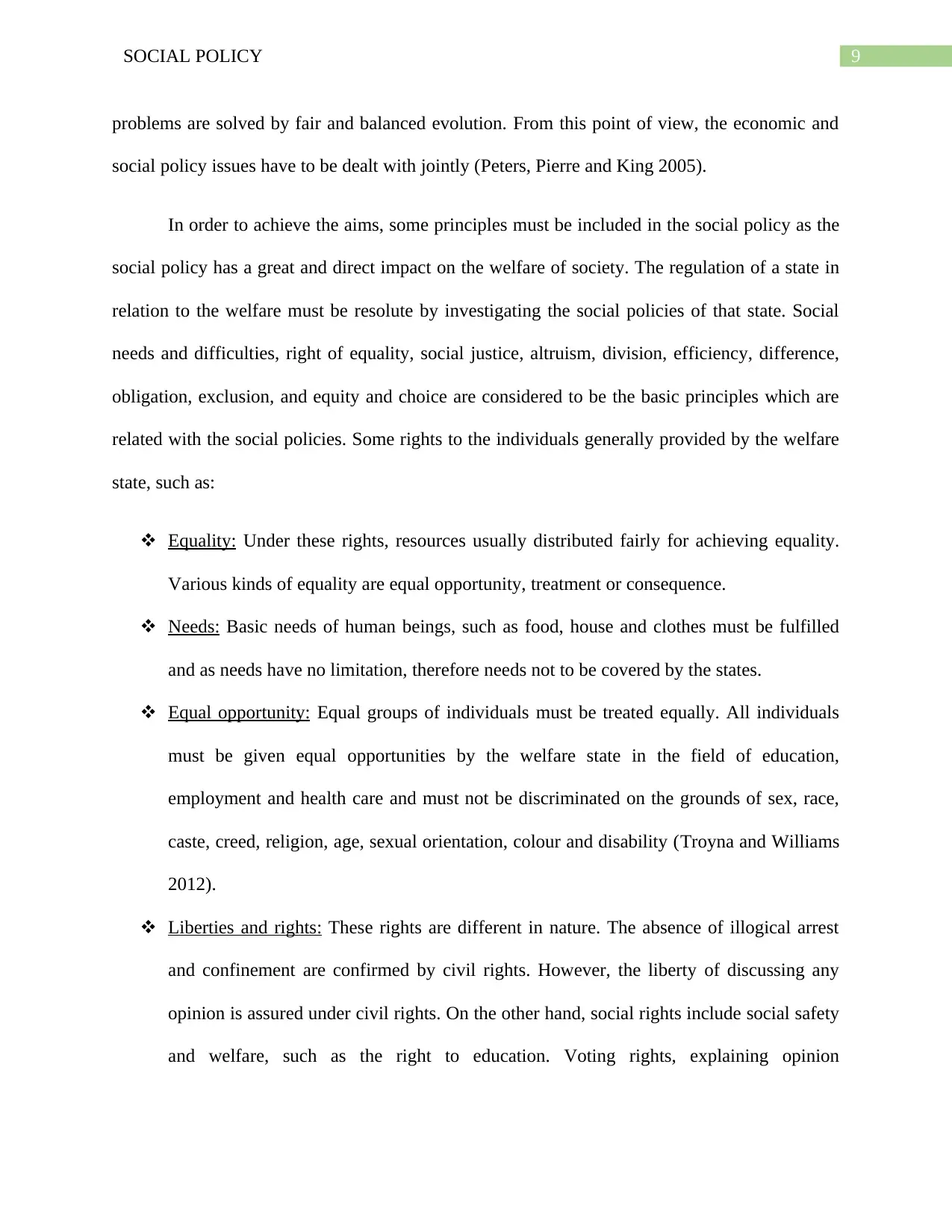
9SOCIAL POLICY
problems are solved by fair and balanced evolution. From this point of view, the economic and
social policy issues have to be dealt with jointly (Peters, Pierre and King 2005).
In order to achieve the aims, some principles must be included in the social policy as the
social policy has a great and direct impact on the welfare of society. The regulation of a state in
relation to the welfare must be resolute by investigating the social policies of that state. Social
needs and difficulties, right of equality, social justice, altruism, division, efficiency, difference,
obligation, exclusion, and equity and choice are considered to be the basic principles which are
related with the social policies. Some rights to the individuals generally provided by the welfare
state, such as:
Equality: Under these rights, resources usually distributed fairly for achieving equality.
Various kinds of equality are equal opportunity, treatment or consequence.
Needs: Basic needs of human beings, such as food, house and clothes must be fulfilled
and as needs have no limitation, therefore needs not to be covered by the states.
Equal opportunity: Equal groups of individuals must be treated equally. All individuals
must be given equal opportunities by the welfare state in the field of education,
employment and health care and must not be discriminated on the grounds of sex, race,
caste, creed, religion, age, sexual orientation, colour and disability (Troyna and Williams
2012).
Liberties and rights: These rights are different in nature. The absence of illogical arrest
and confinement are confirmed by civil rights. However, the liberty of discussing any
opinion is assured under civil rights. On the other hand, social rights include social safety
and welfare, such as the right to education. Voting rights, explaining opinion
problems are solved by fair and balanced evolution. From this point of view, the economic and
social policy issues have to be dealt with jointly (Peters, Pierre and King 2005).
In order to achieve the aims, some principles must be included in the social policy as the
social policy has a great and direct impact on the welfare of society. The regulation of a state in
relation to the welfare must be resolute by investigating the social policies of that state. Social
needs and difficulties, right of equality, social justice, altruism, division, efficiency, difference,
obligation, exclusion, and equity and choice are considered to be the basic principles which are
related with the social policies. Some rights to the individuals generally provided by the welfare
state, such as:
Equality: Under these rights, resources usually distributed fairly for achieving equality.
Various kinds of equality are equal opportunity, treatment or consequence.
Needs: Basic needs of human beings, such as food, house and clothes must be fulfilled
and as needs have no limitation, therefore needs not to be covered by the states.
Equal opportunity: Equal groups of individuals must be treated equally. All individuals
must be given equal opportunities by the welfare state in the field of education,
employment and health care and must not be discriminated on the grounds of sex, race,
caste, creed, religion, age, sexual orientation, colour and disability (Troyna and Williams
2012).
Liberties and rights: These rights are different in nature. The absence of illogical arrest
and confinement are confirmed by civil rights. However, the liberty of discussing any
opinion is assured under civil rights. On the other hand, social rights include social safety
and welfare, such as the right to education. Voting rights, explaining opinion
Paraphrase This Document
Need a fresh take? Get an instant paraphrase of this document with our AI Paraphraser
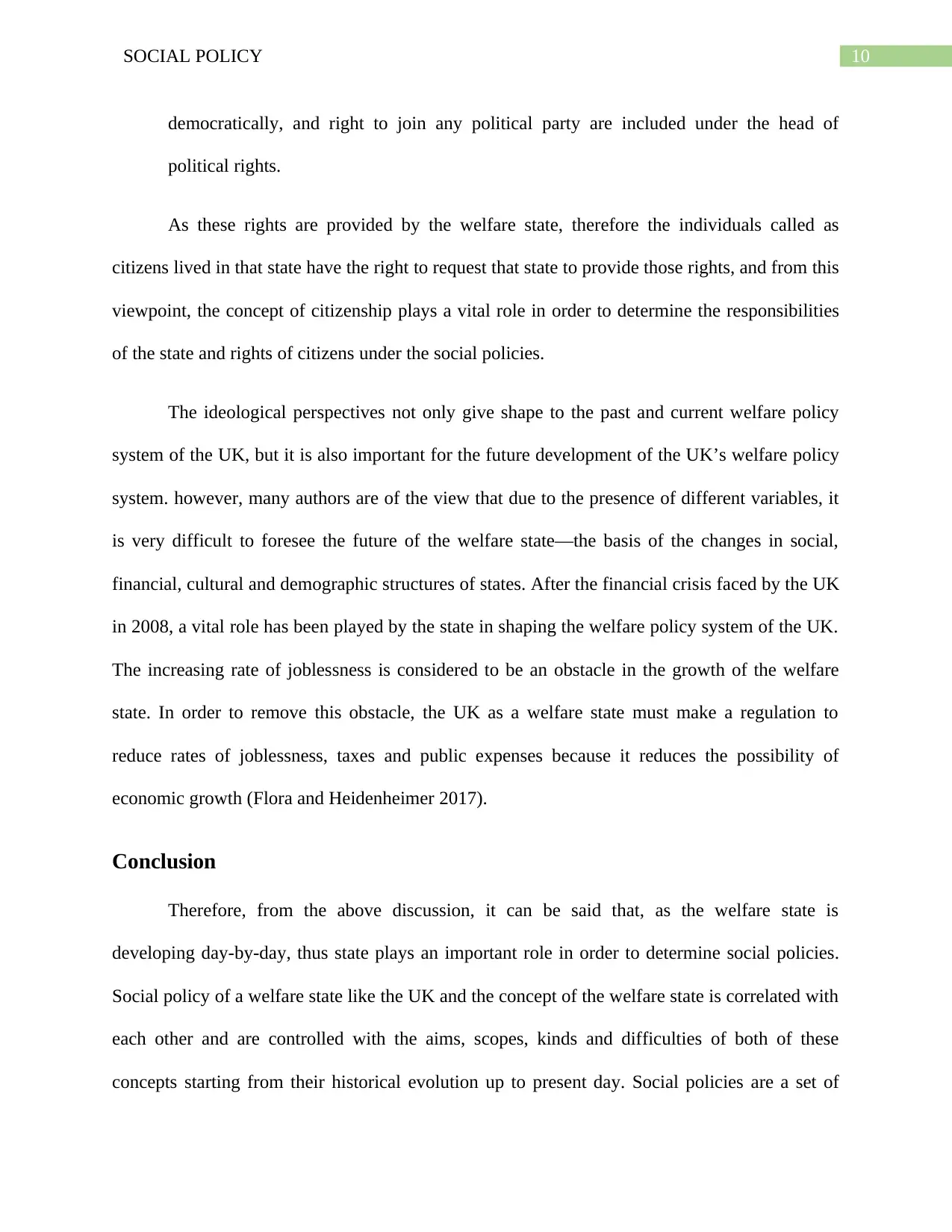
10SOCIAL POLICY
democratically, and right to join any political party are included under the head of
political rights.
As these rights are provided by the welfare state, therefore the individuals called as
citizens lived in that state have the right to request that state to provide those rights, and from this
viewpoint, the concept of citizenship plays a vital role in order to determine the responsibilities
of the state and rights of citizens under the social policies.
The ideological perspectives not only give shape to the past and current welfare policy
system of the UK, but it is also important for the future development of the UK’s welfare policy
system. however, many authors are of the view that due to the presence of different variables, it
is very difficult to foresee the future of the welfare state—the basis of the changes in social,
financial, cultural and demographic structures of states. After the financial crisis faced by the UK
in 2008, a vital role has been played by the state in shaping the welfare policy system of the UK.
The increasing rate of joblessness is considered to be an obstacle in the growth of the welfare
state. In order to remove this obstacle, the UK as a welfare state must make a regulation to
reduce rates of joblessness, taxes and public expenses because it reduces the possibility of
economic growth (Flora and Heidenheimer 2017).
Conclusion
Therefore, from the above discussion, it can be said that, as the welfare state is
developing day-by-day, thus state plays an important role in order to determine social policies.
Social policy of a welfare state like the UK and the concept of the welfare state is correlated with
each other and are controlled with the aims, scopes, kinds and difficulties of both of these
concepts starting from their historical evolution up to present day. Social policies are a set of
democratically, and right to join any political party are included under the head of
political rights.
As these rights are provided by the welfare state, therefore the individuals called as
citizens lived in that state have the right to request that state to provide those rights, and from this
viewpoint, the concept of citizenship plays a vital role in order to determine the responsibilities
of the state and rights of citizens under the social policies.
The ideological perspectives not only give shape to the past and current welfare policy
system of the UK, but it is also important for the future development of the UK’s welfare policy
system. however, many authors are of the view that due to the presence of different variables, it
is very difficult to foresee the future of the welfare state—the basis of the changes in social,
financial, cultural and demographic structures of states. After the financial crisis faced by the UK
in 2008, a vital role has been played by the state in shaping the welfare policy system of the UK.
The increasing rate of joblessness is considered to be an obstacle in the growth of the welfare
state. In order to remove this obstacle, the UK as a welfare state must make a regulation to
reduce rates of joblessness, taxes and public expenses because it reduces the possibility of
economic growth (Flora and Heidenheimer 2017).
Conclusion
Therefore, from the above discussion, it can be said that, as the welfare state is
developing day-by-day, thus state plays an important role in order to determine social policies.
Social policy of a welfare state like the UK and the concept of the welfare state is correlated with
each other and are controlled with the aims, scopes, kinds and difficulties of both of these
concepts starting from their historical evolution up to present day. Social policies are a set of
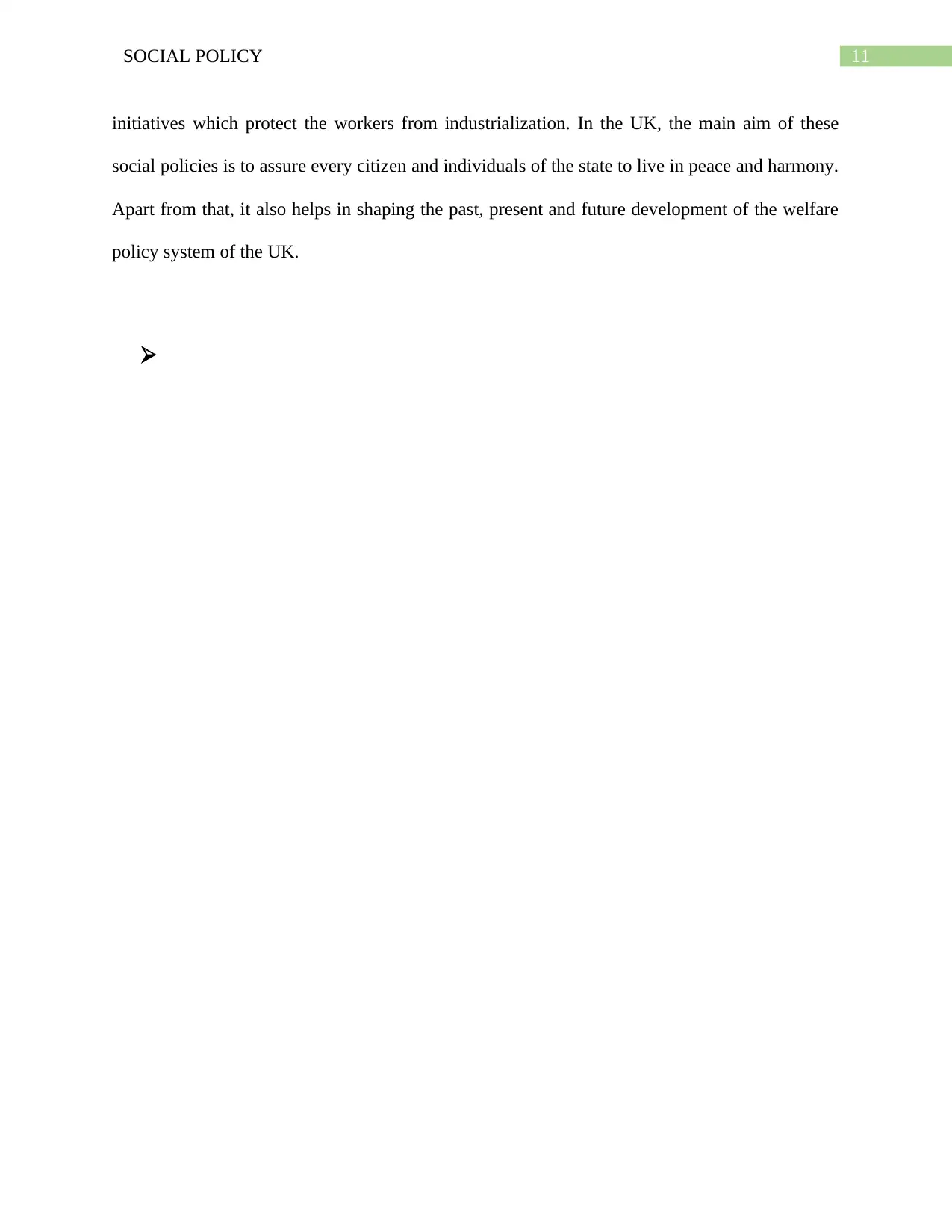
11SOCIAL POLICY
initiatives which protect the workers from industrialization. In the UK, the main aim of these
social policies is to assure every citizen and individuals of the state to live in peace and harmony.
Apart from that, it also helps in shaping the past, present and future development of the welfare
policy system of the UK.
initiatives which protect the workers from industrialization. In the UK, the main aim of these
social policies is to assure every citizen and individuals of the state to live in peace and harmony.
Apart from that, it also helps in shaping the past, present and future development of the welfare
policy system of the UK.
⊘ This is a preview!⊘
Do you want full access?
Subscribe today to unlock all pages.

Trusted by 1+ million students worldwide
1 out of 14
Related Documents
Your All-in-One AI-Powered Toolkit for Academic Success.
+13062052269
info@desklib.com
Available 24*7 on WhatsApp / Email
![[object Object]](/_next/static/media/star-bottom.7253800d.svg)
Unlock your academic potential
Copyright © 2020–2026 A2Z Services. All Rights Reserved. Developed and managed by ZUCOL.




